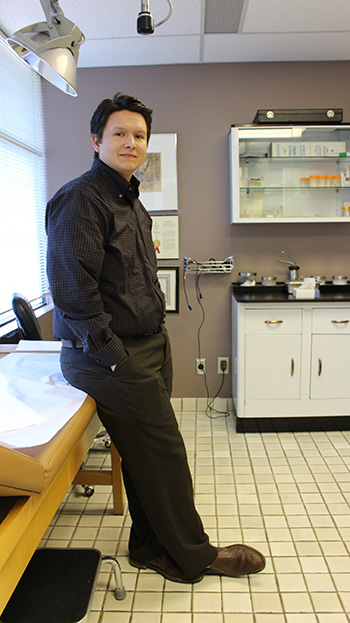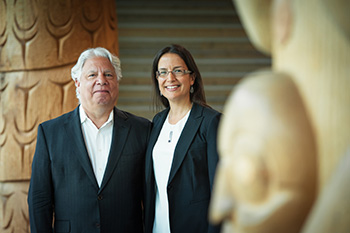Toma Timothy’s journey to becoming an Aboriginal doctor was not exactly straight. But looking back, there were some clear turning points.
The first one came when he was 11 or 12: an older cousin, Evan Adams, who had left Powell River to attend university, returned to their reservation on the Sunshine Coast to share his experiences, including doing genetic experiments with fruit flies.
A year or two later, one of his friends – a fellow member of the Sliammon Band – took her own life. From his grief, Dr. Timothy resolved “to do something for others who were suffering.”
And then, a year or two later, an opportunity came along that fused the excitement of the first experience with the determination that grew from the second. He joined fellow Aboriginal teens for a week at UBC, learning about careers in health and the life sciences, touring the anatomy lab, and listening to lectures from professors.
“It was my first exposure to university – no one in my family had gone to university before, so it was all new to me,” he recalls.
From there, the road continued to twist and turn, but almost inevitably, led him to an MD from UBC, earned in 2009. Dr. Timothy now works as one of three physicians at a family practice in White Rock.
A few others came before him, and more have followed. But indigenous students are still under-represented in health professional programs – an imbalance widely viewed as a major reason for the disparity between B.C.’s Aboriginal people and the rest of the population on several health measures, including life expectancy (75 years compared to 81), youth suicide (3.0 per 10,000 youths, compared to 0.7), and diabetes (8 per cent, compared to 5.8 per cent).
Those continuing disparities explain why UBC created the Centre for Excellence in Indigenous Health.
A pair of gifts
Quietly launched in early 2014, the centre will foster research into Aboriginal communities’ particular health problems, and optimize the indigenous component of health science curricula. But it has a more immediate goal: boosting representation and retention of Aboriginal students in health professions, especially physicians, nurses, dentists and pharmacists, so indigenous communities can take a larger role in their own well-being.
Based in the School of Population and Public Health, the centre is led by Martin Schechter, a Professor and former Director of the school, and Nadine Caron, an Assistant Professor in the Department of Surgery and the first Aboriginal woman to earn a medical degree from UBC.
The centre gained crucial momentum this June from two $1 million gifts: one from UBC Chancellor Lindsay Gordon and his wife Elizabeth, and the other from Vancouver investment manager Rudy North, his wife Patricia, their daughter Caroline and son, Rory.
“For too long, Canada’s indigenous peoples have been dependent on outsiders for their health care,” Patricia North says. “We hope our gift will enable Aboriginal patients to receive care from those who best understand their needs – Aboriginal health professionals.”
Elizabeth Gordon’s volunteer involvement in Vancouver’s Downtown Eastside led to her interest in indigenous health.
“I have worked there for several years and witnessed the homelessness, mental health problems and addiction issues that affect many of its residents, a disproportionate number being Aboriginal,” she says. “This experience led us to search for ways to improve their health and well-being.”
Both gifts target the centre’s initiatives at recruiting and retaining Aboriginal students, but also target distinct needs. Nearly half of the Gordons’ gift will provide financial aid for Aboriginal students. The Norths are supporting the summer science program (the same one attended by Dr. Timothy), a mentoring program aimed at Aboriginal high school students, and the creation of a new certificate program for aboriginal health.
Hitting the target
In an unintended coincidence, but one whose symbolism was hard to overlook, the gifts were announced just as UBC’s Aboriginal MD Admissions Program met its unofficial benchmark, first set in 2002: graduating 50 more Aboriginal students by 2020.
The Faculty created the Aboriginal admissions program after realizing that boosting indigenous representation in the MD program required a more deliberate strategy. Until that point in the medical school’s 41-year history, only 10 Aboriginal students – including Dr. Caron – had earned medical degrees from UBC.
To achieve the “50 by 2020” goal, the Faculty set aside 5 per cent of its MD seats for Aboriginal students each year, based on the proportion of Aboriginal people in B.C. But it also provided advice and encouragement to Aboriginal high school and university students considering a career in medicine, and mentoring to Aboriginal students who ultimately joined the medical program.
“For too long, Canada’s indigenous peoples have been dependent on outsiders for their health care. We hope our gift will enable Aboriginal patients to receive care from those who best understand their needs – Aboriginal health professionals.”
Patricia North, Donor
In May, five Aboriginal students received MDs from UBC – not only hitting the magic number of 50, but surpassing it by four.
“The Faculty of Medicine has created a very supportive environment for Aboriginal students,” says Kelsey Louie, one of those five recent graduates. “They understand that our communities represent so much of who we are, and how challenging it is to be away from our families and traditional lands to finish medical school. So they try hard to create a ‘home away from home,’ through Aboriginal gatherings, ceremonies and circles, which keeps us grounded and balanced.”
Dr. Louie begins his residency this summer in the UBC Indigenous Family Practice Program, which aims to prepare trainees for the particular needs of indigenous patients.
“In my experience, some patients can’t even worry about their medical issues because they have other, more pressing concerns,” says Dr. Timothy, who has worked at the Kla-How-Eya Healing Place, a First Nations clinic in Surrey, and whose older cousin, Evan Adams, is now the Chief Medical Officer of B.C.’s First Nations Health Authority. “They may be dealing with addiction issues, familial issues, financial issues, or mental health issues. As an Aboriginal physician, I have an inherent understanding of those issues. That’s why it’s so important to encourage more Aboriginal youth to become physicians.”
Ellie Parton, a member of the Wei Wai Kum band of the Kwakwaka’wakw First Nation, is on her way.
Overcoming self-doubt
Growing up in Campbell River, she never imagined herself being a physician. Apart from a dental hygienist, she never saw any members of her community working as a health professional, and no one from her family had ever gone to university. On top of that, she became a mother at 16.
But pre-natal visits to the doctor’s office stirred in her an ambition to help other women in need. Despite having to care for her baby, Parton returned to school, and started on a new path – focusing on her schoolwork, graduating high school and enrolling at at the University of Victoria.
Her first year there, she attended a pre-admission workshop organized by UBC’s medical program, where one of the speakers was Dr. Adams.
“I still had a lot of self-doubt at that point,” she says. “But after attending the workshops, and hearing Evan Adams describe his journey, I realized that becoming a doctor was a real possibility.”
With financial assistance from three different scholarships, Parton has completed her second year in the Vancouver-Fraser Medical Program. She has continued to attend the MD pre-admission workshops, now as an advisor to other Aboriginal students. And with two years to go before earning her degree, she is already serving as an example to others.
“One of my young cousins was interviewed in the community newsletter, and when they asked her what she wanted to be when she grew up, she said, ‘I want to be a doctor like my cousin Ellie,’ ” Parton says. “She is facing a lot of challenges. But she sees me, and she is not letting her future be defined by her past or her present.”

